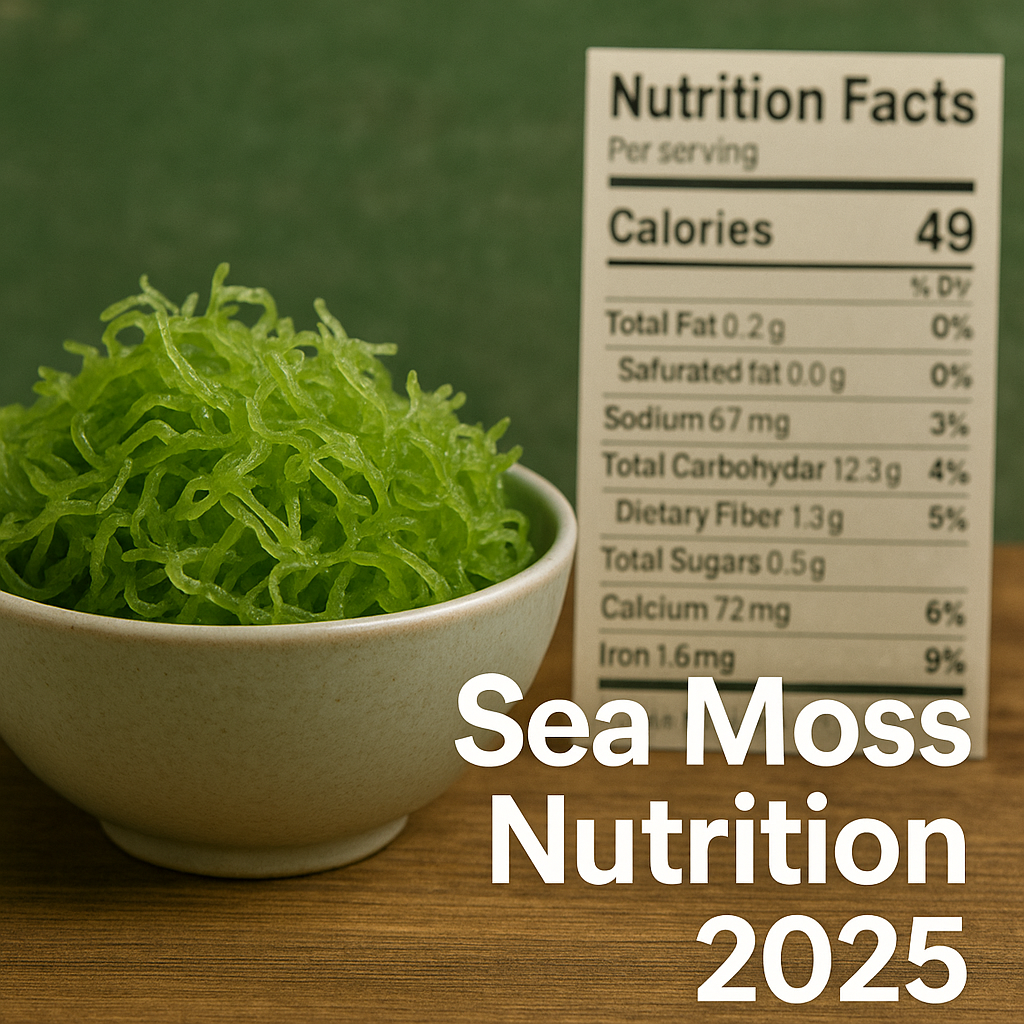Introduction
In 2025, sea moss continues to dominate global wellness trends as one of the most powerful natural superfoods. Packed with 92 essential minerals, rich in vitamins, and low in calories, this marine treasure is gaining popularity among health-conscious consumers, athletes, and beauty enthusiasts alike.
But what exactly makes sea moss so nutritionally powerful? In this complete 2025 guide, we’ll break down the nutritional profile, health benefits, and daily recommended dosage—helping you understand why sea moss has become a superfood superstar.
1. Sea Moss Nutritional Overview
Sea moss, scientifically known as Chondrus crispus, is a type of red algae naturally found in the Atlantic Ocean. Its nutrient density makes it a complete powerhouse for energy, immunity, and gut health.
Quick Nutrition Snapshot (Per 2 Tbsp Serving / ~10g Dried Sea Moss)
| Nutrient | Amount | % Daily Value (DV) |
|---|---|---|
| Calories | 5 kcal | 0% |
| Carbohydrates | 1.2 g | <1% |
| Protein | 0.2 g | <1% |
| Fiber | 0.5 g | 2% |
| Iodine | 47 mcg | 30% |
| Calcium | 12 mg | 1% |
| Magnesium | 14 mg | 3% |
| Potassium | 68 mg | 2% |
| Iron | 0.9 mg | 5% |
| Zinc | 0.3 mg | 2% |
| Vitamin C | 3 mg | 4% |
| Vitamin K | 5 mcg | 4% |
| Folate (B9) | 15 mcg | 4% |
Pro Tip: Wild-harvested sea moss has a higher mineral content than pool-grown varieties.
2. Top Vitamins in Sea Moss
Sea moss is naturally rich in essential vitamins that boost overall health:
-
Vitamin A: Supports skin health and vision.
-
Vitamin C: Boosts immunity and aids collagen production.
-
Vitamin K: Strengthens bones and promotes blood clotting.
-
B-Vitamins (B2, B9, B12): Enhance energy production and brain health.
3. Essential Minerals in Sea Moss
Sea moss contains up to 92 of the 102 minerals our bodies need, making it a mineral-rich superfood:
-
Iodine: Supports thyroid function and metabolism.
-
Calcium: Strengthens bones and teeth.
-
Magnesium: Helps with muscle recovery and stress relief.
-
Zinc: Enhances immunity and wound healing.
-
Iron: Increases energy and oxygen transport.
4. Sea Moss for Gut & Digestive Health
The natural prebiotic fiber in sea moss feeds healthy gut bacteria, improving:
-
Digestion & nutrient absorption
-
Gut microbiome balance
-
Reduced bloating & constipation
Trending 2025 Tip: Sea moss tea is now widely used for gut health support.
5. Sea Moss for Skin, Hair & Beauty
Sea moss’s collagen-boosting nutrients make it a top ingredient in 2025 skincare routines:
-
Sulfur compounds reduce acne and inflammation.
-
Collagen support improves skin elasticity.
-
Hydration retention keeps skin soft and glowing.
6. Recommended Daily Dosage in 2025
| Form | Recommended Amount | Best Use |
|---|---|---|
| Raw Sea Moss | 1–2 Tbsp | Smoothies, soups, teas |
| Sea Moss Gel | 2 Tbsp daily | Shakes, desserts |
| Sea Moss Capsules | 1–2 capsules daily | Convenient consumption |
⚠️ Important: If you have thyroid issues or are pregnant, consult your doctor before consuming sea moss due to its iodine content.
7. Choosing High-Quality Sea Moss in 2025
When buying sea moss products, look for:
-
✅ Wild-harvested certification
-
✅ Third-party lab testing
-
✅ Sustainable sourcing practices
-
✅ Minimal processing for maximum nutrients
Sea Moss Global Tip: Always prefer organic, sun-dried sea moss for optimal quality.
8. Sea Moss Nutrition vs. Other Superfoods
| Superfood | Minerals | Vitamins | Calories (per 10g) | Fiber |
|---|---|---|---|---|
| Sea Moss | 92+ | A, C, K, B | 5 kcal | 0.5 g |
| Spirulina | 60+ | B1, B2, B3 | 40 kcal | 0.3 g |
| Chia Seeds | 30+ | C, E, K | 49 kcal | 3.5 g |
Conclusion
In 2025, sea moss stands out as a nutrient powerhouse, offering 92 essential minerals, potent vitamins, and antioxidants—all in just a few calories.
Whether you’re using it in smoothies, teas, or skincare routines, sea moss delivers significant health and beauty benefits when sourced sustainably and responsibly.
Explore Sea Moss Global’s premium wild-harvested sea moss products today and unlock your healthiest self.
Relevance: Updated 2025 insights on sea moss nutrition, benefits, and trends.

